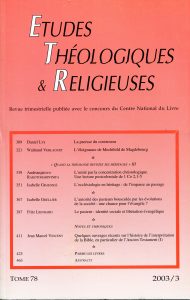Mechthild de Magdebourg, première mystique en langue allemande au milieu du XIIIe s., élabore au milieu de son oeuvre, La lumière fluente de la Divinité, un concept particulier, la « gotz vroemedunge », traduit ici par « éloignance », néologisme construit sur le modèle de « suivance ». Ce concept, qui se donne chez Mechthild sur le mode narratif, est ici décliné par Waltraud Verlaguet sur le plan historique, sémantique et psycho-anthropologique, pour mettre en évidence sa pertinence dans le croisement de ces stratégies.
Cet article reprend les principaux résultats de sa thèse La théologie de Mechthild de Magdebourg : le concept d' »éloignance », soutenue à Montpellier sous la direction d’Hubert Bost.
Mechthild of Magdeburg, first mystic to write in German in the middle of the 13th century, has fashioned in her work « The flowing light of Divinity » a specific concept called « gotz vroemedunge » translated here by the word « eloignance », a neologism derived from the example of « suivance ». This concept is presented by Mechthild in the narrative mode and is here approached alternatively from a historical, a semantic and a psycho-anthropological perspective in order to highlight its relevance when criss-crossing these strategies.
p. 321-337
Auteur
VERLAGUET Waltraud
Waltraud VERLAGUET est docteur en théologie de l'Institut protestant de théologie, Faculté de Montpellier
